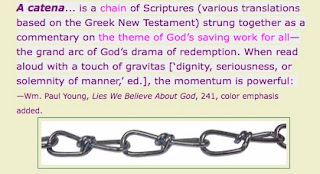Truths We Believe About God, Part 7
A Biblical & Theological Rejection of Wm. Paul Young’s book, Lies We Believe About God
Part 1: Truths We Believe About God
Part 2: Doing the Universalist Twist
Part 3: OUR Way or THE Way?
Part 4: An Imaginary Cosmic Reality
Part 5: Universalism & Trinitization
Part 6: A Catena: The Chain of “All”
—The Apostle Peter (2 Peter 3:14-16, NASB)
A Review of the Book’s Chapters
Commentary on the “All” Passages in A Catena continued, 13-22
13. Romans 11:36 (NASV, emphasis Young’s):
“For from him and through him and to him are all things.”
To begin with, “all things” [Greek neuter gender, ta panta] does not refer to people. People are not things. The purpose of the movement of “all things” in the universe—deriving from, passing through and arriving to the Lord—is described in the exultant praise which follows, “To Him be glory forever. Amen.” (Romans 11:36b) The Apostle means God, not the universe, would be exalted, glorified and honored! (Contra Romans 1:21; New Age Pantheism.). As Dr. Witmer summarized how the second half of the verse clarifies the beginning, “God is the first Cause, the effective Cause, and the final Cause of everything…. The all-sovereign God deserves the praise of all His creatures.”[71] The glory of God, not the salvation of humanity, is the message which explains the future and final movement of everything to God. While people may be part of that movement they are not the sum of it. “For he [the Father] hath put all things under his [the Son’s] feet…. And when all things shall be subdued unto him [the Son], then shall the Son also himself be subject unto him [the Father] that put all things under him, that God may be all in all” (1 Corinthians 15:27-28).
14. Romans 11:32 (DBT/Greek NT, emphasis Young’s):
“He has shut up all to unbelief so that he might have mercy on all.”
At the end of Romans chapter 8, the Apostle Paul states that “nothing” will separate Christian believers from “the love of God” (Romans 3:39). If the “no separation” rule is true, the question arises, what about Israel? For their disobedience did not the Lord separate the Jews from His love, and if Israel became separated from God’s love, how can Christians be confident that will never happen to them? Is not the love of the Lord “everlasting”? (See Jeremiah 31:3.) So the overriding question answered by the Apostle Paul in Romans chapters 9-11 is this: Has God separated His covenant love from the Israel? Is God through with the Jew? While in these chapters his answer includes the role of all Gentiles in general, it also regards all Israel in particular.
The following references Israel to be the Apostle’s focus: Romans 9:3-4—“my kinsmen… who are Israelites”; 9:5—though Christ is descended from Israel’s fathers, He “is over all”; 9:6—“they are not all Israel”; 9:7—“they are not all children” of Abraham; 10:12—“the same Lord is Lord of all” (Jew and Greek); 10:16—“they did not all heed the good news” (Jews and Greeks); 11:26—“so all Israel will be saved”; and 11:32—“God shut up all [Israel] in disobedience so that He may show mercy to all [Israel and the Gentiles]. Thus, “until the fullness of the Gentiles has come in,” the Lord’s work in the world is currently centered on the Gentiles (Romans 11:25). When this interim period ends, when the cup of time is filled, the Lord will return His attention to Israel. He will keep the covenant promises He made to Israel because “the gifts and the calling of God are irrevocable” (Romans 11:29). But until then, “God has shut up all [Israel] in disobedience so that He may show mercy to all [Jews and Gentiles]” (Romans 11:32). At the end of this period of Gentile ascendancy in world history, the Lord will return His blessing to the Jews. Gentiles, we’re on the clock!
About the “alls” used by the Apostle Paul, do they mean that salvation-reconciliation is universal as Young’s “catena” quotes them to mean? In alternating reference between Israel and the nations in these chapters (Romans 9-11), all can refer to Gentiles exclusive of Israel, or all can refer to Israel exclusive of Gentiles, or all can refer to the sum of both groups. The Apostle is not discussing the eternal salvation of “all” humans, but rather the working out of His earthly plan among “all” peoples/nations whether they be Jew or Gentile.
Statements in the context raise contradictions to Young’s teaching of universal salvation. Consider the following: “For they are not all Israel who are descended from Israel” (Romans 9:6); “Jacob I loved, but Esau I hated” (Romans 9:13-15); “He has mercy on whom He desires, and He hardens whom He desires” (Romans 9:17-18); “God… endured with much patience vessels of prepared for destruction,” or “vessels of mercy… prepared beforehand for glory” (Romans 9:19-23); “If you confess with your mouth Jesus as Lord, and believe in your heart that God raised Him from the dead, you will be saved”; et cetera. I raise these texts not to engage the questions they stimulate, but rather to point out that contradictory statements reside in the very context from which Young extracts a text he thinks asserts universal reconciliation. These statements do not fit Paul Young’s salvation template at all!
15. 1 Corinthians 15:22 (NIV, emphasis Young’s):
“For as in Adam all die, so also in Christ all will be made alive.”
In this chapter the Apostle argues against Corinthians who asserted, “There is no resurrection of the dead!” (1 Corinthians 15:12, 15). For Christians, denying the resurrection shatters the Christian faith because coupled with Jesus’ death for our sins this event is core to the Gospel (1 Corinthians 15:1-5). To deny the resurrection of Jesus is to destroy the Christian faith. So the Apostle sets forth the consequences of embracing a naturalistic worldview which denies the resurrection of the dead. If nobody’s raised, then Christ was not raised and His make-believe resurrection makes preaching a sham, faith worthless, Christians without forgiveness and hopeless in a world dominated by death, all of which reduces Christians to be a pitiable people (1 Corinthians 15:13-19). In other words, why celebrate Easter? But against the naysayers at Corinth the Apostle states: “But now Christ has been raised from the dead!” (1 Corinthians 15:20).
It is in this context that Paul states, “For as in Adam all die, so also in Christ all will be made alive” (1 Corinthians 1:20). Universalists like Young, Kruger, Hannah Whitall Smith (1832-1911) and others stake their case on this verse which seemingly suggests all humanity will be saved, that just as “all” died in Adam, so correspondingly “all” will be made alive in Christ.[72] If one’s understanding is fixated only upon verse 22, to the neglect of the immediate and greater biblical contexts, then the Apostle’s statement might “seem” to imply that everybody will be saved. Therefore the text must be considered and a rebuttal offered.
Separating this verse from the immediate context and the Apostle’s other writings raises three counterpoints to universal salvation. First, to the Corinthians Paul was addressing the question of the resurrection, not how persons come to be in Christ (“so in Christ all will be made alive,” 1 Corinthians 15:22b). The description of being “made alive” refers to God’s promise that Christian believers will one day be resurrected, and does not equate to all humanity being regenerated (i.e., “born again,” John 3:5).
Second, Paul states that by His resurrection from the dead, Christ is “the first fruits of those who are asleep” (1 Corinthians 15:20, 23). If Christ is “the first fruits” the question arises, who are “the second fruits”?[73] The answer is found in the same verse that mentions “first fruits,” namely that “the second fruits” are resurrected believers who share the life of Christ at His Second Coming (1 Corinthians 15:23). In other words, the Apostle envisions that as distinct from all those who died in Adam, only those who belong to Christ will be raised when He comes (i.e., His Parousia). The rest who do not belong to Christ at His coming, who remained dead in Adam, Jesus will devastatingly and grievously say after their separate resurrection, “I never knew you.” (Matthew 7:23; 25:16; Isaiah 26:19; Ezekiel 37:12-14; Daniel 12:1-2; John 5:28-29; Revelation 20:11-15). The designation “those who are Christ’s at His coming” differentiates and distinguishes believers from the rest who died and remained dead in Adam (1 Corinthians 15:21-22). All people do not belong to Christ, only those who are “in Christ” (“if any man be in Christ,” and that’s a big IF, 2 Corinthians 5:17).
Third, Christ is called “the first fruits of those who are asleep” (Emphasis added, 1 Corinthians 15:20). As he does elsewhere in his letters, Paul uses the euphemism “sleep” to describe death. In his earlier letter to the Thessalonians the Apostle used “sleep” to describe “death.” He tells that Christian congregation to not grieve over death “as the rest who have no hope” (Emphasis added, 1 Thessalonians 4:13). In this verse Paul differentiates between believers and the rest. In both Thessalonians and Corinthians Paul tells readers that one day the alarm will sound, the Day of the Lord will begin and the resurrection of those “who have fallen asleep in Jesus” will intersect with Jesus’ Second Coming, after which will come “The End!” (1 Thessalonians 4:15; 1 Corinthians 15:23) Why will the dead “in Christ” be raised then? Because they had fallen asleep “in Jesus”! Herein resides the contrast between those who have no hope because they remained dead in Adam and those who have hope because they (and their believing-deceased loved ones) became alive in Christ and belong to Him.
About this chapter’s mention of the resurrection F.F. Bruce commented, “Paul might have agreed that even the resurrection of the wicked depends in some sense on the resurrection of Christ, but his present concern is to show that the resurrection of ‘the dead in Christ’ (cf. I Th. 4:16), i.e. those who have ‘fallen asleep’, is ensured by Christ’s resurrection.”[74] About this verse teaching all will be saved because all will be raised, Leon Morris stated: “The verse gives no countenance to universalism. In Adam all that are to die, die; in Christ all that are to live, live.”[75] However, even if the “alls” are viewed as equivalent, that in solidarity the same group who died in Adam will be resurrected in Christ, “all” will still face judgment as Jesus promised, some unto “a resurrection of life” and others to “a resurrection of judgment” (John 5:29).
and every eye shall see Him,
and they also which pierced Him:
and all kindreds of the earth shall wail because of Him.
Even so, Amen.
—Revelation 1:7
16. 1 Corinthians 15:24-28 (NASB/Holman CSB/Greek NT, emphasis Young’s):
“Then comes the end, when He hands over the kingdom to God the Father, when He abolishes all rule and all authority and power. For He must reign until He puts all His enemies under His feet. The last enemy to be abolished is death. For God has put everything under His feet. But when it says “everything” is put under Him, it is obvious that He who puts everything under Him is the exception. And when everything is subject to Christ, then the Son Himself will also be subject to the One who subjected everything to Him, so that God may be all in all.”
Then comes the end! These verses describe the future that began with Jesus Christ’s resurrection. We’re on the clock! With Jesus’ resurrection the last days have begun (1 Corinthians 15:20). The end will come when “all things” become subject to Christ. Then the Son will submit both “all things” and Himself to the Father “so that God may be all in all” (1 Corinthians 15:28). In the period between His resurrection and the end there will occur the Parousia of Christ (His return) attended by the resurrection of “those who are Christ’s at His coming.” The Lord’s Prayer will be answered (“Thy kingdom come. Thy will be done in earth, as it is in heaven,” Matthew 6:10) When His kingdom comes, the Lord Jesus Christ will abolish “all rule and all authority and power” and “death” (1 Corinthians 15:24-27). When everything is conquered, then Christ will hand the universe which He created over to the Father “so that God may be all in all.” This is the future for a rebel and corrupted cosmos.
In the scenario just described, universalist Paul Young views the submission of everything to Christ to mean everybody becomes saved. The problem with his projection is that the passage does not teach this. Contradictions are evident: First, in the resurrection the Apostle differentiates between “those who are Christ’s” and the rest who died in Adam (e.g. universal resurrection is not in view).
Second, Christ’s enemies will be forced to submit to His earthly kingdom rule (Messiah’s enemies will be put “under his feet”—He will stand victorious over them, Paul wrote in his quotation of Psalm 110:1 in 1 Corinthians 15:25.). This means conflict. The nations will not willingly submit to Messiah. As the nations hate Israel they also despise he Messiah. Presently Messiah’s enemies are “control freaks” constantly agitating and rebelling against Him (Psalm 2:1-3). They will not voluntarily submit to Christ but will be forced to! Messiah will step on necks of His enemies. As Psalm 110 concludes, “The Lord… shall strike through kings in the day of his wrath. He shall judge among the heathen, he shall fill the places with the dead bodies, he shall wound the heads over many countries” (Psalm 110:5-6). Now universally rejected, Messiah’s rule will one day be universally accepted (See Philippians 2:9-11.).
These Messianic Psalms (Psalms 8 and 110) to which the Apostle alludes in stating his case for Christ’s resurrection do not picture universal salvation. To state again, submission it appears is a one not two-way street, everything first to Christ and then Christ and everything to God. As Paul Young believes, submission is not everybody submitting to everybody including God. It appears that cosmopolitans and God do not as Young would have it, reside in a gigantic circle of relationship. (See The Shack, p. 122)
17. Philippians 3:21 (Holman CSB, emphasis Young’s):
“He will transform the body of our humble condition into the likeness of His glorious body, by the power that enables Him to subject all things [the HCSB reads “everything” not all things, ed.] to Himself.”
Interestingly, just prefatory to this text which Young quotes as implying universal salvation, Paul tells readers that contrary to his example, “many walk… [who] are enemies of the cross of Christ, whose end is destruction, whose god is their appetite, and whose glory is their shame, who set their minds on earthly things” (Philippians 3:17-17). Are we to assume that these pretentious walkers who are “enemies of the cross of Christ” and “whose end is destruction” are reconciled to God? He calls the rebels “enemies of the cross.” I thought reconciliation means that true believers are friends of the cross (i.e., reconciliation means to “change from enmity to friendship”).[76]
Further “all things” (Greek ta panta) does not include all people. Paul is writing about the Lord Jesus Christ’s power not His people. Though the concept was in his vocabulary and he used it often, the Apostle Paul did not say “all men” (Greek pantas anthropous; See next discussion.). In his desire to find a text supporting universal reconciliation Young quotes from a verse preceded by the description of individuals who are implacably hostile to the Cross of Christ! Such persons do not fit the paradigm of universal salvation. A person cannot an “enemy of the cross” and a friend of God.
 |
| Barbed wire at Dachau (source) |
18. 1 Timothy 2:4 (ESV, emphasis Young’s):
“He desires all people to be saved and to come to the knowledge of the truth.”
If God desires all people to be saved, His desire indicates not all are saved. End of discussion. But if you need or want to, read on…
The Apostle encourages Timothy to pray for “all men” (Greek panton anthropon) in positions of governmental authority, which “is good… in the sight of God our Savior” (1 Timothy 2:1-3). The very next verse states that the God to whom we pray “desires all men (pantas anthropous) to be saved and to come to the knowledge of the truth” (1 Timothy 2:4). Paul then states that “there is one God, and one mediator also between God and men, the man Christ Jesus who gave Himself as a ransom for all, the testimony given at the proper time” (1 Timothy 2:5-6). The Apostle closes this paragraph by testifying of his being appointed as an Apostle to preach and teach this message—one God for all, one mediator for all, one ransom for all—to the Gentile world (1 Timothy 2:7). In this context Paul Young thinks he’s found a Scripture which supports the salvation of all people.
What’s the identity of “all men”? Some would restrict that identity, based upon the parallel between verses one and four (all men, all men), to mean that God desires the salvation of all men in governmental authority. Though true, this meaning is too restrictive (Titus 2:11; 2 Peter 3:9). In general, God desires everybody to be saved and to know the truth indicating that in the present reality all persons do not know the truth and are not saved.
Universalism makes God’s wish needless in that He’s wishing for humans to possess something they already possess; namely their salvation. About this divine wish, Hiebert notes “that does not mean all will be saved. If Paul had used an active infinitive ‘to save,’ rather than the passive, that might have been implied.”[77] The difference between passive and active could read like this: God desires all men to be saved (passive infinitive) versus God desires to save all men (active infinitive). MacDonald comments that, “From this, it should be clear that this verse does not teach universal salvation. Although God desires that all men should be saved, yet not all men will be saved.”[78]
19. Titus 2:11 (ESV, emphasis Young’s):
“For the grace of God has appeared, bringing salvation to all people.”
Upon viewing this verse, two questions arise: first, who’s included in the designation “all people”; and second, what does salvation mean in this context? First, the Apostle Paul exhorts Titus about “the things which are fitting for sound doctrine,” how in everyday living beliefs should affect behavior. Doctrine or teaching should influence practical Christian living among “all people” (Greek pasin anthropois) whether they are older men, older women, young women, young men, or bond slaves (Herein Paul is not endorsing slavery but recognizing its existence in the ancient world; See Galatians 3:28.). This list is partial.
Second, all people are not saved in a vacuum. When saved, they should not live unto themselves. Inevitably their lives touch others, and their salvation ought to bear upon their relationships with others no matter what their status in life is. The salvation the Apostle wrote of does not regard the hereafter but the here and now![79] This verse provides no proof, despite contrary arguments by some early church fathers, for universal salvation.
20. Hebrews 1:1-2 (ESV/Greek NT, emphasis Young’s):
“He appointed the Son heir of all things, through whom also he made the universe. In these last days he has spoken to us by his Son, whom he appointed heir of all things.”
Note: Seemingly in his desire to find another “all” in Bible, Young repeats the designation “heir of all things” (heir of all things… heir of all things) in his quotation of Hebrews 1:1-2. In the text, whether English or Greek, the phrase occurs once, not twice. Young’s handling of the English Standard Version is repetitive and misleading to readers.[80]
Again, and I know some readers are getting as tired of me saying this as I am tired of reading Young’s continued interpretation of “all things” (panton) to support his salvific scheme: People are not things and things are not people. The author of Hebrews (whom personally I believe was Paul the Apostle) could have stated that the Son was “appointed heir” of all men (Greek panton anthropon), meaning all people regardless of ethnicity, gender or station in life are Christ’s inheritance. But the author does not. So what then does the adjective “all things” refer to?
The clue is found in the next verse when the author states that the Son “upholds all things by the word of His power” (Emphasis added, Hebrews 1:3). Bruce comments: “The creative utterance which called the universe into being requires as its complement that sustaining utterance by which it is maintained in being.”[81] The very creation the Son now upholds is the very creation (all things) He will inherit (Compare Psalm 2:8.). When the universe consummates, the Son will inherit everything because one, in the past He created the universe (everything) and two, in the present He keeps the universe (everything) together (The power of gravity is His.). By the way, the Psalm Hebrews quotes pictures the nations constantly plotting, scheming and colluding together to steal the Son’s inheritance from Him—not a good picture of universal reconciliation.
21. 2 Peter 3:9 (KJV/Greek NT, emphasis Young’s):
“He is not willing that any should perish, but that all should come to repentance.”
The coming Day of the Lord; this is the dominating subject of the third chapter of Peter’s Second Epistle. During the last days, the interim period between Jesus’ First and Second Comings (We’re living in the last days and have been now for two-thousand years!), skeptics will arise who in their lusts (wantonly sold out to “feel good” lifestyles) will mock any prospect of divine intervention/judgment upon the world that might interrupt the fun they’re having (2 Peter 3:3-4). Like some evangelicals, they’re too busy seeking personal pleasure to believe biblical prophecy. But such mocking flies in the face of the Apostle’s warning of coming judgment as based upon words spoken by the holy prophets and Jesus Christ (Isaiah 2:10-20; Joel 2:1-3; Malachi 4:1-3; Matthew 24:21). Mockers who deny the prospect of coming judgment ignore the fact that in the past God cataclysmically judged the world by the Flood (2 Peter 3:5-6; Genesis 7:21-24). So Peter put skeptics on notice: as promised by the prophets and Jesus, judgment is coming. But in part, what form would the judgment take?
“The day of the Lord will come like a thief, in which the heavens will pass away with a roar and the elements will be destroyed with intense heat, and the earth and its works will be burned up” (2 Peter 3:10). While in the past God destroyed this planet by water, in the future He will destroy this planet by fire. To this point, some scientists believe that currently our planet rests on a precipice of destruction. If the tipping point should occur, then this universe “will change into a new universe (called a phase transition). This would look like a fireball spreading out at the speed of light, converting the old universe into a new one.”[82] Sound familiar? The only difference between this scientific scenario and the one Peter prophesied is that God controls the universe, the universe does not control God (though process theologians, open theists and quantum charismatics believe the later to be more the case).
The verse Paul Young quotes rests between Peter’s description of those who mock the Day of the Lord—it’ll never happen—and his description of the Day of the Lord—it’ll happen! God is not a slacker. The Lord delays the day of judgment not because He’s cumbersome about keeping promises, but because He “is patient toward you, not wishing that any should perish but for all to come to repentance” (2 Peter 3:9).
As regards the correctness of citing this verse in support of universal salvation-reconciliation, these observations contradict that belief. First, the Apostle Peter states that the Lord’s patience is “us-ward” (KJV, Greek eis humas, “unto you”). Peter limits the scope of who he’s addressing. That Peter restricts his audience (“you”) indicates he’s not talking about the whole world. Second, that God is “not wishing for any to perish” indicates that just as in the era before the flood, people are perishing. All were not saved then nor are all saved now. Third, Peter informs readers that the Day of the Lord is reserved for the judgment of “ungodly men” (2 Peter 3:7). This designation does not picture that all men are reconciled to God. After all, they’re “ungodly”!
—Jude 14-15, (Emphases added)
Fourth, God’s desire is not God’s decree. He has not decreed all men will be saved. As the scholar Hiebert wrote: “‘Not wishing’ (me boulomenos) does not refer to the ultimately determining will of God but rather to His standing wish or desire for mankind.”[83] And fifth, for all men to be reconciled to God all men need to repent before God. God wishes for this to be the case (2 Peter 3:9b, the Lord wishes “for all to come to repentance”), but it isn’t. All people do not repent. Esau didn’t (Hebrews 12:17). People who are alive when the final hammer of God’s judgment falls upon this planet will not repent (Revelation 9:20-21; 16:9). People before the Flood did not repent. Many who follow after false teachers will not repent (2 Peter 2:1-22). Neither will many of those “mockers” Peter writes about in this chapter repent. They’re too busy indulging themselves in pleasures. In light of all these considerations-contradictions, do we really think this verse supports a teaching that God decreed the universal reconciliation of everybody?
22. Revelation 21:5 (AKJV, emphasis Young’s):
“Then He who sat on the throne said, ‘Behold, I make all things new’.”
The futuristic vision of the Apostle John in Revelation 21-22 concerns the creation of “a new heaven and a new earth” (Revelation 21:1). What John saw was God’s universal re-creation of everything not His universal reconciliation of everyone. Two features of the passage indicate this: First, those who will inherit the new universe are described as those who overcome, and to those overcomers the Lord promises “I will be his God and he will be My son” (Revelation 21:7). Who is the “overcomer”? In his 1st Letter John identifies the overcomer as “he who believes that Jesus is the Son of God” (1 John 5:5). The name “overcomer” also designates the believer who is faithful to the Lord in the church (Revelation 2:7, 11, 17, 26; 3:5, 12, 21). Second, John pictures “under-comers” as having no place in the future created world.
and the abominable, and murderers,
and whoremongers, and sorcerers,
and idolaters,
and all liars,
shall have their part in the lake
which burneth with fire and brimstone:
which is the second death.
—Revelation 21:8
The above verse, just two verses after the verse Young cites, contradicts his belief in the salvation of everybody. What John refers to by quoting the Lord’s words—“Behold, I am making all things new”—is universal re-creation, not universal reconciliation. If John had any doubts about whether this new creation would happen, the Lord told him, “Watch Me!” (i.e., “Behold, I am making all things new.”) A stunning portrayal of the New Jerusalem follows—“brilliance like a costly stone… of crystal-clear jasper… a great high wall… twelve gates… the city is laid out as a square… pure gold like clear glass… foundation stones… of every kind of precious stone… twelve gates… each one a single pearl.” Is there any question that this passage concerns the re-creation of all things and not the reconciliation of all people?
To be continued . . .
Endnotes:
[71] Ibid: 487.
[72] As she was overwhelmingly burdened by the prospect of people going to hell, of being lost forever, Hannah walked the streets of Philadelphia with veiled eyes to hide the faces of the lost she felt compassion for. For how long this went on she did not know. But in her heart she argued with God. One day when on a tram, she raised her veil as the conductor collected the fee, and saw the faces of two strangers sitting across from her. Upon that sight, she explains her mystical experience: “Then suddenly God seemed to answer me. An inward voice said, in tones of infinite love and tenderness, ‘He shall see of the travail of His soul and be satisfied.’ ‘Satisfied’ I cried in my heart, ‘Christ is to be satisfied! He will be able to look at the world’s misery, and then at the travail through which He has passed because of it, and will be satisfied with the result! If I were Christ, nothing could satisfy me but that every human being should in the end be saved, and therefore I am sure that nothing less will satisfy Him.’ And with this a veil seemed to be withdrawn from before the plans of the universe, and I saw that it was true, as the Bible says, that ‘as in Adam all die even so in Christ should all be made alive.’ As was the first, even so was the second. The ‘all’ in one case could not in fairness mean less than the ‘all’ in the other. I saw therefore that the remedy must necessarily be equal to the disease, the salvation must be as universal as the fall.” H. W. S. (Mrs. Pearsall Smith), The Unselfishness of God and How I Discovered It: A Spiritual Autobiography (New York, NY: Fleming H. Revell Company, 1903: 204-205. Later editions of the book omit this incident from her biography. See Hannah Whitall Smith, The Unselfishness of God: My Spiritual Biography (Princeton, NJ: Littlebrook Publishing, Inc., 1987).
[73] I recognize that “first fruits” is an agricultural term used in the Bible to describe “the part that is best” or to “the first to be ripe” by which appearing provided expectation for a greater harvest to follow. See Dictionary of Biblical Imagery, Leland Ryken, James C. Wilhoit and Tremper Longman III, General Editors (Downers Grove, IL: InterVarsity Press, 1998): 289.
[74] F.F. Bruce, 1 and 2 Corinthians (Greenwood, SC: The Attic Press, Inc., 1971): 146.
[75] Leon Morris, The First Epistle of Paul to the Corinthians (Grand Rapids, MI; Wm. B. Eerdmans Publishing Company, 1958): 214.
[76] W.E. Vine, Expository Dictionary: 932.
[77] D. Edmond Hiebert, First Timothy (Chicago, IL; Moody Press, 1957): 53.
[78] MacDonald, Believer’s Bible Commentary: 2068.
[79] One meaning of salvation (soteria) involves “the present experience of God’s power to deliver from the bondage of sin.” See W.E. Vine, Expository Dictionary: 988, SALVATION (c).
[80] For comparison, here is how Hebrews 1:1-2 in the ESV reads: “1 Long ago, at many times and in many ways, God spoke to our fathers by the prophets, 2 but in these last days he has spoken to us by his Son, whom he appointed the heir of all things, through whom also he created the world.” (Emphasis added.)
[81] F.F. Bruce, The Epistle to the Hebrews, Revised Edition (Grand Rapids, MI: William B. Eerdmans Publishing Company, 1990): 49.
[82] “Stephen Hawking says Higgs boson has potential to destroy entire universe,” News.Com.Au, September 8, 2014 (http://www.news.com.au/technology/science/stephen-hawking-says-higgs-boson-has-potential-to-destroy-entire-universe/story-fn5fsgyc-1227050890169). In science’s search for the minutest matter/energy composing the universe (the Higgs Boson particle), the “nudge” causing the collapse of our universe into nothing could be the building of a giant research collider (a machine) that will create enough empty space in it to begin the compression of matter within it, which collapse would then spontaneously spread throughout the universe (kind of like one atomic bomb going off and triggering more and more subsequent explosions until our whole planet is engulfed in a ball of fire and a cloud). As Hawking envisions this doomsday scenario, “This could mean that the universe could undergo catastrophic vacuum decay, with a bubble of the true vacuum expanding at the speed of light. This could happen at any time and we wouldn’t see it coming.” One scientist compares the state of the current energy field to that of a rock rolling down a valley. “It may get lodged in a crevice high up from the valley floor. We [he and other physicists] think that the Higgs field could be at this point, and something might nudge it to fall to the true floor (lowest energy state).” If that should happen, then, “Whoosh!”—“the elements will be destroyed with intense heat, and the earth and its works will be burned up” (2 Peter 3:10). The point: modern science is talking about the possibility of same thing happening as did Jesus, the prophets and the Apostles predicted, the difference being that God not man or the universe will control the whole process.
[83] D. Edmond Hiebert, Second Peter and Jude: An Expositional Commentary (Greenville, SC: BJU Press, 1989): 156.













